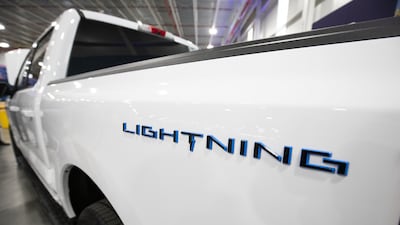The Detroit suburb of Dearborn is known for two main things: it has the largest population of people with Arab heritage outside the Middle East; and it is home to the Ford Motor Company's world headquarters.
Everywhere you look in Dearborn, the influence of Arab Americans and Ford can be seen. There’s the Glass House building, Ford’s headquarters where up to 3,000 people work. The Henry Ford College is situated close to the Islamic Centre of America, itself a Dearborn landmark for the past 60 years, which is at 19500 Ford Road. A short drive east is the Henry Ford Medical Centre.
“Ford’s impact on this city’s past, present, and future is immeasurable. Our journeys share so many common threads, from serving as a hub of opportunity for new immigrants to playing a role in creating the modern middle class,” says Abdullah Hammoud, who in 2021 became Dearborn's first Muslim and Arab American mayor.
“You’d be hard-pressed to run into a Dearbornite whose story does not intersect with Ford Motor Company at some point.”

For the past century, many of those stories played out at the Rouge Ford Complex, the manufacturer's sprawling factory. And it’s here that Ford's grand ambitions for the next century of transport are taking shape too.
Today, Ford is in the process of building a new, 18.5-hectare research and development campus, where the new Ford F-150 Lightning electric truck, the latest version of the most popular vehicle in America for the past 45 years, is being built.
In March, Ford announced that due to popular demand it would triple its output of the F-150 Lightning, the first all-electric, full-sized pickup truck to hit America’s motorways and worksites, to 150,000 a year at the recently opened Rouge Electric Vehicle Centre.

It is also taking the truck global. Recently, Ford announced it would sell the Lightning for the first time overseas, in Norway, a country where 80 per cent of new car sales are electric and where there is an extensive battery charging infrastructure for the driving public.
The pickup is expected to go head-to-head with Tesla's Cybertruck when it is released later this year.
$5 a day
Like thousands of others, immigrants from the Levant descended on Dearborn and Detroit a century ago after Henry Ford offered workers $5 a day, a revolutionary wage at the time.
During the early part of the 20th century, Arab immigrants increasingly moved into the row houses in south Dearborn that had been built by Henry Ford’s companies. Until the end of the Second World War, most Arab immigrants came from Syria and Lebanon.
Henry Ford is said to have recruited Arabs, especially people from Yemen, because of their shipbuilding and maritime skills.
“In the '20s, when he [Henry Ford] opened the Rouge plant, he wanted to control the vertical integration of everything, so he owned the ships that would bring the materials into the factory,” says Matthew Jaber Stiffler of the Centre for Arab Narratives at the Arab American National Museum in Dearborn.
Ford also owned about 285,000 hectares of land in Michigan, Minnesota and Wisconsin that was mined for metals and other raw materials used to produce his motor cars.
“There were a lot of Yemenis working on those ships. We know that as a fact. To this day there are Yemenis who work on the lakes on long-haul shipping.”

Now, while electric vehicles are undoubtedly the future of transport, recent events suggest that path is unlikely to run in a straight line. Battery-powered cars are known to have caused major fires in dozens of incidents around the world.
Ford has not been unscathed. In February, a fire from a F-150 Lightning truck at a Ford vehicle holding property in Dearborn destroyed three vehicles, according to video footage seen by CNBC, a US news organisation. The fire halted production at the Rouge Electric Vehicle Centre plant for five weeks.
Still, the move to electric is not about to stop. By the end of 2026, Ford plans to produce two million electric vehicles a year.
All the while, as a next generation of automotive technology takes shape in Dearborn, new waves of immigrants from Yemen, Syria and Iraq are building their lives in the area. Some may go on to help develop the future of driving.
“Dearborn is the perfect backdrop for this historic shift to EVs because of the ingenuity and hustle of our people. Dearborn is the youngest city in metro Detroit, and our young talent pool is hungry for new opportunities and challenges,” says Mr Hammoud, the mayor.
“If I’m betting on any city to keep pace with changes in technology and the economy – if not outpace them outright – I’m betting on Dearborn every time.”


